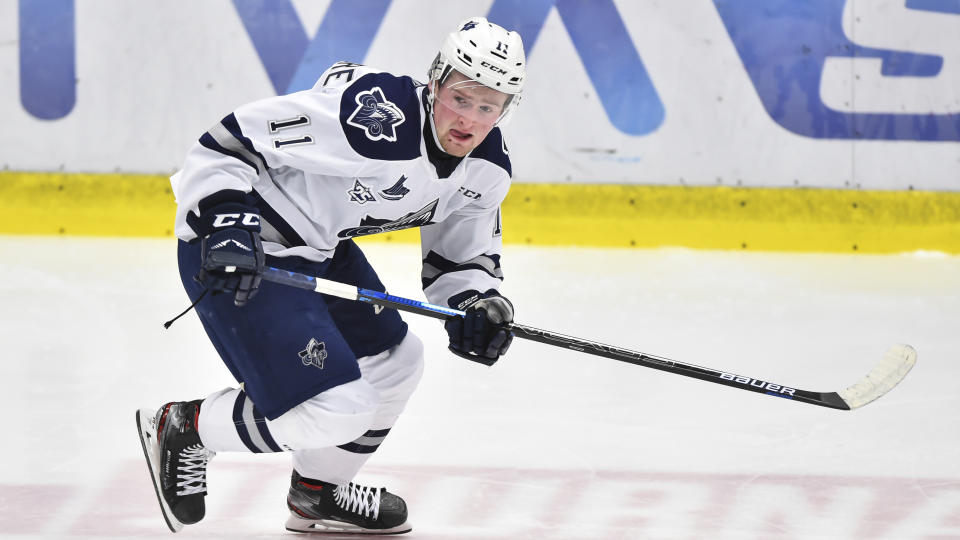What to expect from Team Canada at the 2020 World Juniors
Canada is reeling from last year’s sixth-place finish at the 2019 World Junior Championship, but this year’s entry boasts a legitimate chance to win it all.
There are five returnees from last year’s group, along with a host of young stars that should be making an impact in the NHL before we know it.
Without further ado, here’s what you need to know about Team Canada before it plays its first tournament game against the United States on Dec. 26.
A mix of youth and professional experience for forward corps
It’s become cliche to describe the World Juniors as a “19-year-old’s tournament,” but Canada’s draft-eligible forwards are expected to drive the group toward the gold medal. This is the youngest Canadian team in tournament history, but its relative youth shouldn’t work against the squad.
If you have even remote interest in this year’s team, you’ve probably heard of Rimouski Oceanic superstar Alexis Lafreniere, who leads the CHL in scoring with 70 points. If you haven’t, hop on the bandwagon now before he becomes a household name. Lafreniere is the best prospect since Connor McDavid, is an absurdly talented passer, and will be afforded every opportunity to showcase his world-class offensive game during his second year at the Championship.

Following closely in Lafreniere’s footsteps is Sudbury Wolves forward Quinton Byfield. It’s safe to say that in most years, Byfield would be a presumptive No. 1 pick — a gifted player with an explosive and accurate shot, excellent passing ability and vision, and top-end speed and acceleration. At 6-foot-4, 215 pounds, Byfield is a nightmare to contain physically and should be counted on to provide a strong net-front presence in the offensive zone.
Dawson Mercer is the third draft-eligible forward for Canada, but unlike Lafreniere and Byfield, he was one of the final players to make the team and could feature as the squad’s 13th forward.
𝙇𝙚𝙖𝙙𝙚𝙧𝙨 𝙗𝙚𝙘𝙤𝙢𝙚 𝙜𝙧𝙚𝙖𝙩 𝙗𝙚𝙘𝙖𝙪𝙨𝙚 𝙤𝙛 𝙩𝙝𝙚𝙞𝙧 𝙖𝙗𝙞𝙡𝙞𝙩𝙮 𝙩𝙤 𝙚𝙢𝙥𝙤𝙬𝙚𝙧 𝙤𝙩𝙝𝙚𝙧𝙨.
🇨🇦’s National Junior Team to be led through the 2020 #WorldJuniors by:
©️ - Barrett Hayton
🅰️ - Joe Veleno
🅰️ - Ty Smith
🅰️ - Ty Dellandrea pic.twitter.com/YdQdABr4zy— #WorldJuniors (@HC_WJC) December 25, 2019
The kids are alright, but the responsibility won’t be just on Lafreniere and Byfield — both of whom will almost certainly be in the NHL next winter, barring injury — to steer Canada’s offensive hopes. Barrett Hayton was loaned to Canada from the Arizona Coyotes, where he was used sparingly. Selected with the No. 5 pick in 2018, Hayton could emerge with tournament MVP honours. He’s displayed a penchant for scoring highlight-reel goals against international competition and will be looking to feast on players his own age after having some difficulty acclimating against pros.
Hayton isn’t the only player with professional experience on the team as Detroit Red Wings prospect Joe Veleno also joins Canada on loan. Veleno, who was selected 30th overall in 2018, has spent this season with the AHL’s Grand Rapid Griffins, posting five goals and 12 points in 29 games. After recording only two assists during last year’s tournament, Veleno will be looking for revenge and should factor into Canada’s top six.
It’s a deep forward corps and 2018 first-round picks Liam Foudy (18th overall, Columbus) and Ty Dellandrea (13th overall, Dallas) will likely be relied upon to play larger roles offensively as the bench shortens. Canada should score in bunches this tournament in large part due to its mix of youth and experience.
Byram, returnees to lead defensive effort
Jared McIsaac and Ty Smith are the two returnees from last year’s group and will be leaned on to log major minutes for Canada. Smith is the reigning CHL Defenceman of the Year and he, along with Bowen Byram (selected 4th overall by Colorado in 2019), could contend for tournament all-star honours.
Now down to the final 23-man roster, the Team 🇨🇦 lines at practice are:
Lafrenière-Veleno-Foote
Byfield-Hayton-Cozens
Foudy-Dellandrea-Dudas
McMichael-Thomas-Lavoie
Mercer
McIssac-Smith
Bahl-Bernard-Docker
Byram-Addison
Drysdale
Daws
Hofer
Rodrigue— Mark Masters (@markhmasters) December 21, 2019
McIsaac has played a mere three games this year as he returns from injury, but right-handed shots Jacob Bernard-Docker and Calen Addison could be depended upon to log more minutes if the veteran needs to work his way back to top form.
The wild card among this year’s defence corps is Jamie Drysdale, a 2020 draft-eligible defenceman brimming with offensive talent. Expected to be a top-10 pick in the summer, Drysdale could be in line for a breakout tournament, with his ability to quarterback the power play fully showcased against the world’s best. Assuming that role is a lot to ask of a 17-year-old, but such is a recurring theme for this year’s team.
Uncertainty among goaltenders
Canada’s defined weakness is in goal, where Nico Daws, Joel Hofer and Olivier Rodrigue are all competing for the No. 1 role. Daws, who went undrafted in 2019 and played his way onto Canada’s roster, is on a run that college football fans could compare to that of Heisman Trophy-winning quarterback Joe Burrow. Daws has taken the OHL by storm this year, boasting a blistering .939 save percentage. He may have emerged as the presumptive favourite while the team has yet to indicate who the starter will be ahead of the tournament.
Daws and Hofer suffered injury scares in practice, but both netminders are ready to go despite Rodrigue possibly winning the job by process of elimination. In any event, no one has stood out quite yet for Canada and goaltending may be the team’s undoing if it fails to medal this year.
More hockey coverage from Yahoo Sports

 Yahoo Sport
Yahoo Sport 







































